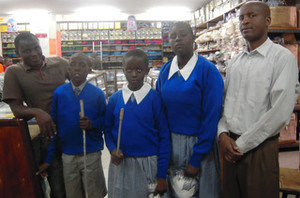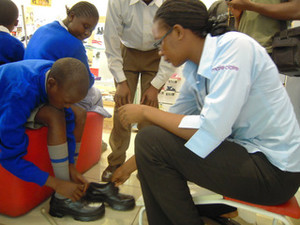Koinonia Community Supports Three Blind Pupils in School
 Koinonia Community has for a second time supported three blind pupils at Nairobi’s Kilimani Primary school in its extensions of goodwill to the needy in society. Three blind needy pupils at the school were presented with new school uniforms on the 19th of January courtesy of the Community, kicking off a new term in fashion despite of their disability.
Koinonia Community has for a second time supported three blind pupils at Nairobi’s Kilimani Primary school in its extensions of goodwill to the needy in society. Three blind needy pupils at the school were presented with new school uniforms on the 19th of January courtesy of the Community, kicking off a new term in fashion despite of their disability.
Koinonia has been putting smiles on faces of needy children at the school, who in their deplorable condition find themselves lacking basic school necessities. The programme was initiated mid last year when Jack Matika, a street educator with the Community while on a duty visit to the school and saw the despair some of those children were in, prompting him to share the idea with other Community members who overwhelmingly approved it.
Several visits to the school thereafter for more consultations with the teachers saw 14- year old Elijah Mwangi then a sixth grader at the school; become the first beneficiary of the scheme last year, receiving a new pair of school uniform. Born blind to a single parent family of three, Elijah is determined against all odds to live his dreams of becoming a lawyer in future.
Mr. Matika who heads Ndugu Mdogo Rescue Centre, an initiative of Koinonia Community has since been running the programme since its inception says it was best also to remember the needy children outside the Community as before.
“This year again as we were doing the school placement for our school children, we thought of also remembering other disabled children who were also in need,” said Matika. “We were able to meet with the school committee who helped us identify these children and this we shared back with Koinonia staff.”
Three of the most in need pupils were selected from the school’s Visually Impaired unit and according to Mr. Bernard Abuko, teacher in charge of the unit at the school, they deserved every help that came their way, owing to the poor background they come from.
Edwin Amwai, a grade 7 pupil second last born in a family of seven, stays with both parents in Ngumo estate. He and his brother were born blind; his father who is partially blind is a gardener working in a nearby estate and mother does small business which hardly can meet obligations for such a big family.
“I feel good and say thank you [Koinonia Community] for your support. I want to be among the top ten in my class with marks above 350,” a jovial Edwin asserts, who won’t like to see his little problem with mathematics as a subject bring him down, although boasts of his prowess for Science, English and Kiswahili.
Also is eleven year old Ruth Ongachi who comes from Kibera’s Silanga village. She too was born blind and stays with the mother and brother after her father died. She said she felt happy about her new uniform and was very thankful to those who bought her. “God bless them,” said Ruth.
For her it’s been very much challenging to get home alone bearing the landscape she has to cope with in the slums where she commutes from daily to school. She talks of many bends, turns and trenches she endures daily have made it hard for her to move alone at home, so has to be picked from the stage by mother or brother, where the school bus leaves her.
Ruth who was very shy throughout the interview says the Braille materials she gets in school have been very helpful in learning. She says her best subjects in class are English and Kiswahili, though a subject like science at times proves challenging to her. She expects to attain over 380 marks in this term and in future she wants to go to a national school, most preferably, Moi girls school Nairobi.

For Sheila Andema a grade seven pupil at the same school who is partially blind, she too wants to go to a national school, Thika School for the blind. She is the only child and lives with both parents in Kawangware but they are unable to provide for her special needs. She recounts of instances she is forced to stay away from school for lack of bus fare or other materials she needs at school.
Sheila likes English and Social Studies as her best subjects in class despite of having problems with Mathematics which she hopes to improve in future. Likes her teachers whom she says have been helpful to solving her problems in class and also her friends who help her in moving around school and going home.
Asked about her new school uniform, Sheila said “I am Happy for Koinonia Community for the new school uniform; it’s just what I needed. Now I can walk around school boldly without shame than before, with my old uniform.”
Regardless of the special needs, education started in Kenya after the end of the Second World War. Education to these children was only offered in special schools until the 1970s when units and integrated programmes were initiated. Special needs education has continued to expand throughout the country.
Though the government declared free primary education (FPE) for ALL Kenyans in 2003, educational opportunities for children (learners) with special needs and disabilities is a major challenge to the education sector.
The national education system has been characterised by lack of systems and facilities that respond to the challenges faced by learners with special needs.
Mr. Abuko says despite of their challenges the pupils, compete with their normal counterparts and at times even surpass them in performance.Lack of tactile materials and other resources has been a major obstacle. He says Braille machines are very expensive and bulky, could not be found in homes for their personal studies and the few in school won’t gratify all of them.
He identifies also lack of enough specialised teachers and that few schools in the city offer programmes for the disabled. Partnering with organisations dealing with people with special needs has helped develop the unit at school as well as support from well-wishers.
“We as Kilimani Primary want to thank Koinonia Community and extend our thanks to Fr. Kizito because he has been a helping hand which we really appreciate,” said Mr. Abuko. “You can even bear me witness as we were buying them [uniform], you could see how much they were excited. I just heard one of them whispering me how better off he is now.”
The school’s deputy head teacher who identified herself as Mrs. Karanja called on parents of children with disabilities to enrol them to schools so as to give them chances of improve their life skills. She said in some families, parents see no use of educating these children, where they are perceived as a source of bad luck.
Mrs. Karanja thanked Koinonia Community for being helpful to the school, calling on the community to get involved with its other activities.
“I would kindly ask the Koinonia Community to pledge more support to keep these children in school and I believe many more disabled children will join,” she said.
Mr. Matika in his closing remarks said he anticipates the initiative will expand in future to improve more lives of children with disabilities and help them realise their dreams.



